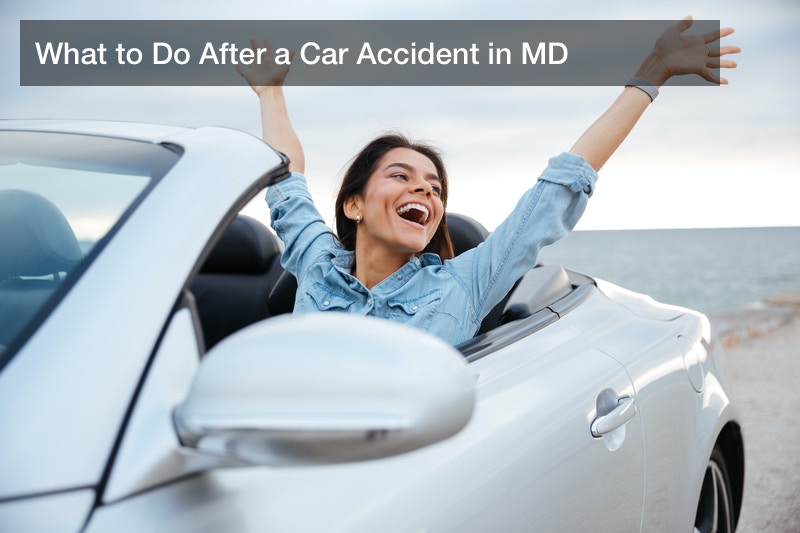
Every state has a few wrinkles about how car accidents and insurance claims are handled, and Maryland is no different. In fact, despite its proximity to Virginia and the District of Columbia, the insurance coverage after a car accident in MD is different the coverage after a accident in VA or DC.
Moreover, state traffic laws in Maryland differ from the traffic laws in Virginia and DC. This means that an auto accident attorney may have a more difficult time proving liability of a driver who causes a car accident in MD than one who causes an accident in VA or DC, or vice versa.
Here is an overview of steps that should be taken after a car accident in MD and how those steps might differ from other states:
Move Out of the Active Roadway
Immediately after an accident, you should move your vehicle out of the active roadway, if possible. This is not only for your safety, but for the safety of the motorists passing by the scene of your accident.
Maryland was one of the last states states to enact a “move over” law for drivers. Maryland’s original law was enacted in 2010, but only covered police cars. The law was later expanded to include tow trucks, fire trucks, medical and rescue vehicles, and service and utility vehicles. As a result, drivers passing a car accident in MD or VA have the same responsibility to move into a lane that is not adjacent to one occupied by an emergency or service vehicle.
Nevertheless, the “move over” law only applies when the emergency or service vehicle with flashing lights arrives on the scene. As a result, you may need to secure the scene until emergency and service vehicles arrive by moving into the emergency lane or shoulder and placing flares, reflectors, or flashers to alert other drivers to the scene of the accident.

This will help to prevent an accident scene from causing a chain reaction of further accidents leading to further damage, injuries, and lawsuits. As any auto and motorcycle accidents law attorney will tell you, over 10% of fatal accidents occur on road shoulders. Moving the cars involved in an accident well away from the active roadway can prevent further injuries and may even save lives.
Exchange Insurance Information
Exchanging insurance information after a car accident in MD is always a good idea. This is the case even though, strictly speaking, drivers are not required to exchange insurance information in every accident.
Under Maryland law, drivers are required to carry personal injury protection (PIP) coverage. This gives drivers the option to file an insurance claim with their own insurance company or the other driver’s insurance company.
For example, suppose the driver of a brand new pickup truck is injured in a car accident in MD that was caused by another driver who ran a stop sign. The driver has a couple of options to recover money for medical bills and GMC Sierra parts to repair the driver’s truck:
- File a PIP claim with the driver’s own insurance company: The driver’s insurance company would pay for medical bills and lost wages but would not pay for parts or repairs to the vehicle.
- File a claim with the at-fault driver’s insurance company: The insurance company for the driver who caused the accident would be obligated to pay for medical bills, lost wages, and parts and repairs for anyone else involved in the accident. The claim cannot exceed the policy limits, however.
- File a lawsuit against the at-fault driver: The at-fault driver is responsible for the losses that are not covered by insurance.
Importantly, Maryland allows a lawsuit to be filed regardless of which insurance option the driver exercises. This is different from no-fault states that restrict a driver’s ability to sue another driver when a PIP claim is filed.
Document the Accident Scene
After a car accident in MD, you should take out your cell phone and take a few pictures of the accident scene and the condition of your vehicle. Documenting the damage and injuries resulting from the accident can help you with your insurance claim and lawsuit afterward.

For example, if your vehicle had substantial customization with aftermarket auto parts, and this was included in your auto insurance coverage, you will want to show how those parts were damaged or destroyed in the accident. If you cannot document these losses, the insurance company might limit you to the stock value of your vehicle.
You should also document the scene of the accident to help you support your version of how the accident occurred. Taking pictures or video of any skid marks, the roadway, and where the vehicle(s) stopped after the accident can provide an expert with the information needed to reconstruct the accident.
This information might even expose other entities to liability for your accident. For example, a lack of skid marks might suggest that your brakes malfunctioned. Based on this evidence, you might be able to identify whether your brake parts were defective or your vehicle was subject to a recall for auto brake service to repair defective brakes.
Seek Medical Attention
If you suffered an injury in a car accident in MD, you should seek medical attention as soon as possible. If you believe that your injury is life-threatening, you should call paramedics from the scene of the accident. If your injury is not life-threatening, you can drive yourself to a quick-care or other medical provider for examination.
Seeking immediate medical treatment provides a few benefits:
- Hidden injuries: Your body is exposed to powerful forces during a car accident that can injure muscles, nerves, bones, and joints. Without medical attention, these injuries could go undetected and worsen in the days after the accident.
- Psychological injuries: Even if your body is not injured, you may suffer psychological trauma, such as post-traumatic stress disorder and other anxiety states. These injuries are just as eligible for compensation after an accident like medical bills, repair costs, and expenses at auto parts stores.
- Documentation: Insurance companies and juries need documentation to compensate you for your injuries. Unfortunately, the insurance company and the other driver will fight against every aspect of your claim. For example, they may take the position that your injuries were not caused by the accident or have been exaggerated. If you seek medical assistance immediately after the accident, you create medical records that document how and when your injuries occurred and how serious they were.
Talk to a Lawyer
Whether you caused a car accident in MD or fell victim to another driver, you should talk to a lawyer after you have sought medical attention.

Car accidents can expose at-fault drivers to substantial criminal and civil liability. If you caused a car accident and are suspected of violating a criminal law, such as reckless driving, driving under the influence, or vehicular homicide, you probably need to consult criminal law attorneys to determine your potential legal exposure. Depending on the extent of the damage and injuries (or deaths), these crimes could result in a lengthy jail sentence and huge fines.
For example, under Maryland law, driving under the influence (DUI) can be punished with a jail sentence up to one year long. However, if a driver has prior DUI convictions or had children in the car at the time of the DUI, the jail time can be doubled or even tripled.
Even if no criminal laws were broken, at-fault drivers are liable for the medical bills, lost wages, and repair expenses that result from accidents they caused. Although insurance will cover damages up to the policy limits, any amounts over the policy limits will be borne by the driver.
The basis of an auto accident lawsuit is negligence. This means that the at-fault driver behaved in some unreasonable way that would foreseeably result in an injury. For example, speeding, turning in front of a vehicle, or following too closely are all risky behaviors that could form the basis of a lawsuit.
Address Your Criminal Liability
If you were at fault for a car accident in MD and your behavior violated a traffic ordinance or criminal law, you need to resolve your criminal liability. If you do not, a warrant could be issued for your arrest and you could spend time in jail for something that could be addressed easily.
Minor traffic infractions are usually handled through a citation. For example, if you were involved in a fender bender in a parking lot when you backed into a car, you could be cited for an improper lookout. This infraction might be subject to a small fine.
However, if you fail to pay the fine, a judge could issue a bench warrant. This means that the police have an obligation to hold you in jail until you can appear in court. While the police will not actively seek you out, will be at risk any time that the police cross your path.
More serious violations of traffic laws might result in an arrest. Specifically, any crime classified under Maryland law as a misdemeanor or felony, rather than an infraction, will likely result in an arrest rather than a citation. Examples include hit-and-run and distracted driving accidents that result in a serious injury or death.
If you are arrested following an auto accident, you will likely be held until an arraignment and bail hearing where you are informed of the charges and bail is set. Bail reforms have been attempted in Maryland, with judges instructed to use the least restrictive means possible to ensure that a defendant returns for trial. Consequently, you might be released without bail if your charges are a misdemeanor or minor drug offense (such as possession of a controlled substance if drugs were found in your car).
For more serious charges, however, a judge might require bail for your release. If this occurs, you will need to either deposit cash with the court or have bail bond agents issue a bond on your behalf before you can be released.
As discussed above, you should talk to a lawyer about your options for resolving your criminal case. Although you should not neglect any civil lawsuits stemming from the accident, the criminal case could deprive you of your freedom, so you should make it one of your top priorities.
Repair or Replace Your Car
Whether you were at fault or a victim in a car accident in MD, you will need to gather repair bids and determine whether your vehicle is a total loss. This process will be necessary to support an insurance claim or lawsuit to recover your property damages.
The decision to total your vehicle or repair it is usually made by an insurance claim adjuster. The claim adjuster will calculate the actual cash value (ACV) of your vehicle based on its make, model, and year. The adjuster will also examine your vehicle and the damage.

If the cost of repairs plus the salvage value is greater than the ACV, repairing the car is not the most economical option and the insurance company will total the car and pay you the ACV instead. On the other hand, if the car can be repaired for less than and ACV, the insurance company will pay you for the repairs instead.
Bear in mind that if the insurance company considers your vehicle to be a total loss, the insurance payout might not be enough to replace your vehicle. As a result, you may need to tap savings or take out local car loans to buy a replacement.
Prevent the Next Accident
After a car accident in MD, you can take steps to prevent the next accident. Some measures that are proven to reduce the risk of car accidents include:
- Slow down: Speeding is a factor in nearly one-third of traffic fatalities. Driving at excessive speeds is not only dangerous for other drivers, but is one of the top causes of injuries and deaths to pedestrians, construction workers, bicyclists, and motorcyclists. Slowing down, especially in inclement weather, can save lives. In Maryland, where the snow usually starts in December, slowing down can reduce both the frequency and severity of accidents.
- Maintain your vehicle: Keeping your fluids topped off and replacing your tires when they are worn will keep your vehicle in good condition and reduce the risk of an accident. Vehicles with worn tire treads are more than ten times likelier to suffer a tire-related car crash than those with normal treads.
- Replace your car: Cars have a limited lifetime. After a certain age, newer technologies can reduce the frequency and severity of accidents. For example, airbags, collision avoidance systems, and anti-lock brakes have made newer cars much safer. If you drive an older car, visit used car dealerships to find a car with a better safety record.
After a car accident in MD, you should think about your next steps in three phases. First, secure and document the accident scene and make sure you seek medical attention. Second, deal with the legal and practical consequences of the accident, including repairing your car and talking to a lawyer. Third, take steps to prevent the next accident or reduce its severity. Approaching car accidents in an orderly way can help you cope with the aftereffects and use them as a learning experience.




